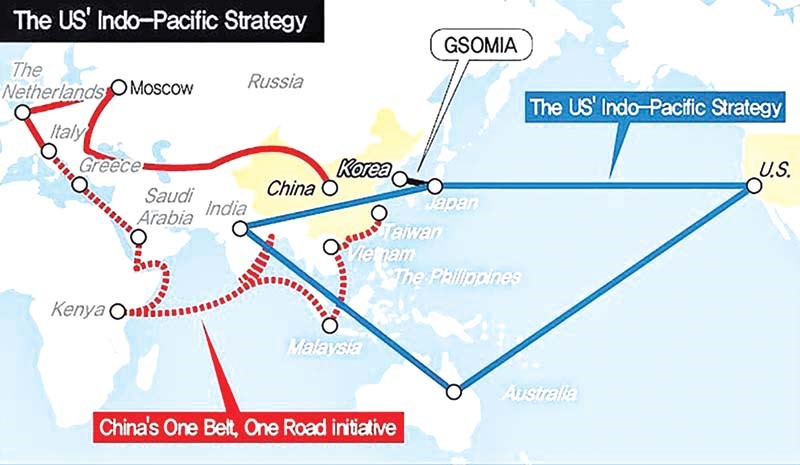[ad_1]

Introduction:
One of the signs of India’s growing centrality in the Indo-Pacific strategic architecture is its burgeoning engagement with key western nations.
Even countries which have been lackadaisical in their regional outreach so far have begun to approach the Indo-Pacific with a new seriousness and have been reaching out to India.
The growth of India’s weight in Indo-Pacific affairs comes at a time when it is becoming clearer that complex regional geopolitical problems cannot be addressed adequately by rigid and structured traditional alliance frameworks.
This aspect is even more evident in the context of the Indo-Pacific, where the geographical vastness of the area and the criticality of the challenges posed by China’s assertive initiatives clash with a region lacking multilateral organisations capable of solving problems effectively.
Italy’s outreach to enter the Indo-Pacific:
Recently, Italy has also begun to signal its intention to enter the Indo-Pacific geography.
- It has done so by seeking to join India and Japan in a trilateral partnership.
- This initiative comes after years of Italy’s relative absence from the geopolitical affairs of the region as it sought to concentrate more on the Atlantic and European dimensions while maintaining good, albeit well below potential, bilateral relations with India.
- At the same time, Italy has become more vocal on the risks emanating from China’s strategic competitive initiatives.
- Recently, Italy described Chinese competitive practices as “unfair” and invited the European Union (EU) to be franker and more courageous in confronting China on its violations of human rights, reiterating that with respect to China “the reciprocal visions of the world are very different”.
- Therefore, countries that share similar values and face similar challenges are coming together to create purpose-oriented partnerships.
- In doing so, they are making it possible for participating nations to address specific common challenges, from maritime security to a coordinated pandemic response, including consolidating and further developing strong reciprocal trade relationships, without compromising the political autonomy of each participant.
India-EU talks for preserving peace and stability in the Indo-Pacific:
- Recently, a virtual India-EU leaders meeting was held between Indian Prime Minister and 27 EU leaders.
- Due to changing geo-political circumstances Europe is changing its perception of India, which can be reflected in this virtual meet also.
- From Indian perspective, collaboration with the EU can promote peace, create jobs, boost economic growth and enhance sustainable development.
- On the Indian side, there is great interest in forging new partnerships with like-minded countries interested in preserving peace and stability in the Indo-Pacific.
- During a recent India-Italy-Japan trilateral, organised by the Italian embassies in India and Japan, Ministry of External Affairs reiterated that the responsibility of keeping the Indo-Pacific free and open, and working for the welfare of its inhabitants falls on like-minded countries within and beyond the region.
- Therefore, the EU and India appear to be natural partners and they need to leverage existing opportunities.
Need for a clear strategy:
With the expression of interest on the Italian side, the first step towards this trilateral has been taken, yet it needs to evolve into something more significant.
The Italian government must formulate a clear Indo-Pacific strategy that must indicate its objectives and, above all, the means and initiatives it is willing to implement on its own and in cooperation with its partners.
Italy’s tendency to privilege diplomatic action through the mechanisms of the EU can be a resource for consolidating the EU-India strategic relationship.
But Italy must go beyond that in defining and implementing, at the margins of the EU’s common initiatives, its own policy with respect to the Indo-Pacific.
Trilateral cooperation is key:
- The India, Italy and Japan trilateral initiative can, and should, be a forum to foster and consolidate a strategic relationship between these three countries, and specifically expand India-Italy bilateral relations.
- As it stands, relations between Italy and Japan are historically strong, and those between India and Japan are a strategic pillar of the free and open Indo-Pacific.
- A trilateral cooperation can be the right forum for India and Italy to learn more from each other’s practices and interests and consolidate a strategic dialogue that should include the economic, the security and the political dimensions.
- The next G20 leaders’ summit in Italy, in October, before the presidency handover to India in 2023, should be the right opportunity for further trilateral coordination on economic and political issues at an institutional level.
- To consolidate the trilateral cooperation in this field, the three countries need to define a common economic and strategic agenda.
Way Forward:
A strategic trilateral between India, Italy and Japan has, in the medium to long term, a lot of potential.
Their compatible economic systems can create a virtuous and mutually beneficial contribution to the reorganisation of the global supply chains that is now being reviewed by many players as a natural result of the Chinese mismanagement of the COVID-19 pandemic.
At the security level, the well-defined India-Japan Indo-Pacific partnership can easily be complemented by Italy, already present in the western Indian Ocean where it is engaged in anti-piracy operations off the coast of Somalia.
Conclusion:
At the multilateral level, the three countries share the same values and the same rules-based world view.
Despite these fundamental convergences, the risk inherent in missing this opportunity also exists.
For this reason, a clear political will is needed from all sides, and Italy, in particular, should recognise its interests in playing a larger role towards the maintenance of a free and open Indo-Pacific.
Robust India-Italy strategic ties can be the first step towards the realisation of this goal.
[ad_2]

